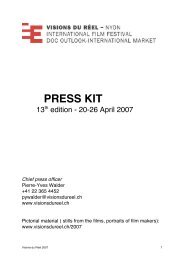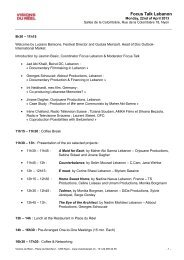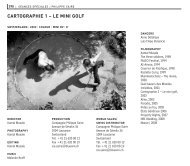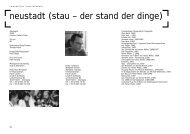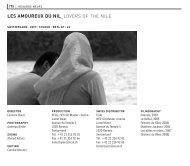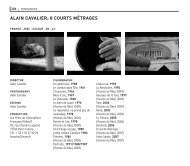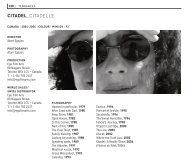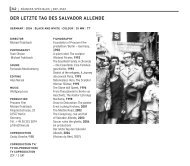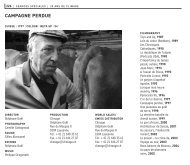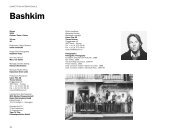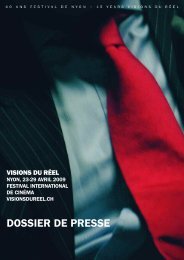Katalog 2013.pdf - Visions du Réel
Katalog 2013.pdf - Visions du Réel
Katalog 2013.pdf - Visions du Réel
Create successful ePaper yourself
Turn your PDF publications into a flip-book with our unique Google optimized e-Paper software.
230 atelier – eyal sivan<br />
Eyal Sivan, Rony Brauman<br />
Un Spécialiste –<br />
Portrait d’un<br />
criminel moderne<br />
France, Germany, Israel, Austria, Belgium | 1999 | 128’ |<br />
35 mm | Hebrew, German<br />
The Specialist – Portrait of a Modern Criminal<br />
Screenplay<br />
Eyal Sivan, Rony Braumann<br />
Cinematography<br />
Leo Hurwitz<br />
Sound<br />
Nicolas Becker,<br />
Philippe Baudhuin,<br />
Thomas Gauder<br />
Editing<br />
Audrey Maurion<br />
Pro<strong>du</strong>ction<br />
Momento Pro<strong>du</strong>ction,<br />
France2 cinema, WDR & BIFF,<br />
Images Creation & RTBF,<br />
Lotus films & ORF, Amythos<br />
Contact<br />
momento!<br />
+33 143662524<br />
contact@momento-films.com<br />
www.momento-films.com<br />
Adolf Eichmann était le responsable<br />
<strong>du</strong> Département aux affaires juives<br />
de la Gestapo, sous le grade de<br />
SS-Obersturmbannführer. Il a servi de<br />
chef des opérations lors de la déportation<br />
de trois millions de Juifs vers<br />
les camps d’extermination. Après la<br />
Seconde Guerre mondiale, le 14 juillet<br />
1950, Adolf Eichmann est parvenu à<br />
s’enfuir en Argentine. Le 11 mai 1960, il<br />
était capturé par une équipe d’agents <strong>du</strong><br />
Mossad et <strong>du</strong> Shin Bet à San Fernando<br />
(Buenos Aires). Son procès a débuté à<br />
Jérusalem le 11 avril 1961. La philosophe<br />
et théoricienne politique Hannah Arendt<br />
l’a couvert pour «The New Yorker», avant<br />
d’écrire un essai intitulé «Eichmann in<br />
Jerusalem: A Report on the Banality of<br />
Evil» qui n’a été publié en Israël qu’en<br />
2000, après la sortie de Un spécialiste.<br />
Sivan a réalisé son film en s’appuyant<br />
sur plus de 350 heures d’images issues<br />
de la Steven Spielbergs Jewish Film<br />
Archive. Son but n’est pas de reconstruire<br />
le procès lui-même, mais de<br />
déconstruire l’idéologie sioniste qui le<br />
sous-tend. L’approche argumentative<br />
de l’exploitation des archives remet en<br />
cause la notion d’histoire et demande le<br />
droit de la re-visionner. «Le documentaire<br />
est l’idée d’une re-vision.» (ES)<br />
SS-Obersturmbannführer Adolf Eichmann<br />
leitete in der Gestapo das Referat<br />
für jüdische Angelegenheiten. Er war für<br />
die Organisation der Deportation von<br />
drei Millionen Juden in die Vernichtungslager<br />
zuständig. Nach dem Zweiten Weltkrieg<br />
gelang Eichmann am 14. Juli 1950<br />
die Flucht nach Argentinien. Am 11. Mai<br />
1960 wurde er in San Fernando (Buenos<br />
Aires) von Agenten des Mossad und des<br />
Schin Bet entführt. Der Eichmann-Prozess<br />
in Jerusalem begann am 11. April<br />
1961. Die Philosophin und Politiktheoretikerin<br />
Hannah Arendt berichtete für<br />
«The New Yorker» aus dem Gerichtssaal<br />
und veröffentlichte später ihr Essay<br />
«Eichmann in Jerusalem: Ein Bericht<br />
von der Banalität des Bösen», das in<br />
Israel erst nach dem Film Sivans 2000<br />
erschien. Sivan, der mit Material aus<br />
Steven Spielbergs Jewish Film Archive<br />
arbeitete, hat seinen Film aus mehr als<br />
350 Stunden gesichtetem Filmmaterial<br />
geschnitten. Sein Ziel ist dabei nicht die<br />
Rekonstruktion des Prozesses, sondern<br />
die Analyse der ihm zugrunde liegenden<br />
zionistischen Ideologie. Die argumentative<br />
Annäherung an das Archivmaterial<br />
ist zugleich eine Infragestellung des<br />
Geschichtsbegriffs und die Forderung,<br />
diesen neu betrachten zu dürfen. «Der<br />
Dokumentarfilm beruht auf der Idee der<br />
Neubetrachtung» (ES).<br />
Adolf Eichmann was the head of<br />
the Department for Jewish Affairs in<br />
Gestapo with the rank of SS-Obersturm<br />
bannführer. He acted as chief<br />
of operations in the deportation of<br />
three million Jews to the extermination<br />
camps. After the end of the Second<br />
World War, Eichmann managed to<br />
escape to Argentina on 14 July 1950.<br />
On 11 May 1960, he was captured by a<br />
team of Mossad and Shin Bet agents<br />
in San Fernando (Buenos Aires). The<br />
trial began in Jerusalem on 11 April<br />
1961. Philosopher and political theorist<br />
Hannah Arendt reported on the trial for<br />
‘The New Yorker’ and later published her<br />
essay ‘Eichmann in Jerusalem: A Report<br />
on the Banality of Evil’ that was published<br />
in Israel only in the year 2000 after<br />
Sivan’s film was released. Sivan, working<br />
with the materials he found in the Steven<br />
Spielberg Jewish Film Archive, culled his<br />
film from over 350 hours of footage. His<br />
aim is not to reconstruct the actual trial<br />
but to deconstruct the Zionist ideology<br />
behind it. The argumentative approach<br />
to the archival footage questions the<br />
notion of history and asks for the right to<br />
re-vision it. “Documentary is the idea of<br />
re-vision.” (ES)<br />
Giona A. Nazzaro



